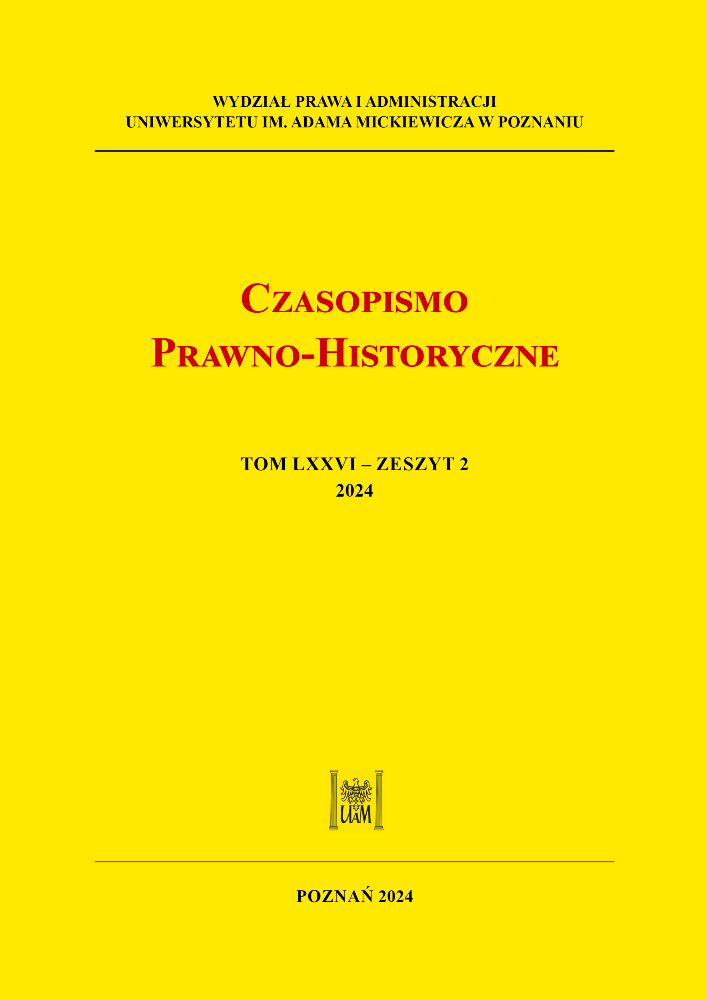Abstrakt
Kodeks karny Królestwa Hawajów z 1850 r. stanowił kodyfikację kompleksową i nowoczesną. Nie był jednak oryginalnym dziełem mieszkańców wysp. Opracował go młody amerykański prawnik William L. Lee na podstawie projektu kodeksu karnego dla stanu Massachusetts. Kodeks wpisywał się w gwałtowne przemiany wyspiarskiego społeczeństwa, dokonujące się pod wpływem białych przybyszów, w tym radykalnych protestanckich misjonarzy, przybywających z USA od 1820 r. Wprowadzał nowe prawo dla tubylców i nie był kodyfikacją, której głównym celem było uporządkowanie i usystematyzowanie wcześniejszych norm. Hawajski kodeks utrwalał nową dla tubylców, chrześcijańską moralność pojmowaną na sposób purytański. Wiele uwagi poświęcono w nim uregulowaniu przestępstw natury seksualnej, a także zachowań związanych z produkcją i sprzedażą alkoholu, zaś ochronę własności oparto na europejskim, a nie tradycyjnym, rozumieniu tego prawa. Nowoczesność kodeksu polegała nie tylko na jasnym sformułowaniu przepisów definiujących typy czynów zabronionych. Mocną stroną aktu z 1850 r. jest część ogólna, z definicją winy i usiłowania, określeniem kontratypów i uregulowaniem problemu udziału z przestępstwie.
Bibliografia
An Act for the better preventing Thefts and Robberies, and for regulating Places of public Entertainment, and punishing Persons keeping disorderly Houses [1751], https://www.irishstatutebook.ie/eli/1751/act/36/enacted/en/print.html.
A code of crimes and punishments [w:] E. Livingston, A system of penal law for the state of Louisiana: consisting of a code of crimes and punishments, a code of procedure, a code of evidence, a code of reform and prison discipline, a book of definitions, prepared under the authority of a law of the said state, Pittsburgh [1833], s. 362–470, https://archive.org/details/systemofpenallaw00liviiala/page/362/mode/2up.
History of the Codes of Louisiana: Criminal Code. The unusual history and early development of Louisiana law, https://lasc.libguides.com/c.php?g=254608&p=1697975.
The Revised Statutes of the Commonwealth of Massachusetts, passed November 4, 1835; to which are subjoined, an act in amendment thereof, and an act expressly to repeal the acts which are consolidated therein, both passed in February 1836; and to which are prefixed The Constitutions of the United States and of the Commonwealth of Massachusetts, Boston 1836.
Penal code of The Hawaiian Islands passed by The House of Nobles and Representatives on the 21st of June A.D. 1850; to which are appended the other acts passed by the House of Nobles and Representatives during their general session for 1850, Honolulu 1850.
Alexander M.Ch., The story of Hawaii, New York – Cincinnati – Chicago [1912].
Alexander W.D., A brief history of the Hawaiian people, Woodstock 1891.
Allen H.G., The betrayal of Liliuokalani last queen of Hawaii 1838–1917, Honolulu 1982.
Daws G., Honolulu. The First Century. The story of the town to 1876, Honolulu 2006.
Daws G., Shoal of time. A history of the Hawaiian Islands, Honolulu 1968.
Dunn B.E., William Little Lee and Catherine Lee, Letters from Hawai’i 1848–1855, „The Hawaiian Journal of History” 2004, t. 38, s. 59–88.
Frear W.F., The evolution ot the Hawaiian judiciary, „Papers of The Hawaiian Historical Society” 1894, nr 7.
Gething J.R., Christianity and Coverture: Impact on the Legal Status of Women in Hawaii, 1820–1920, „Hawaiian Journal of History” 1977, t. 11, s. 188–220.
Haley J.L., Captive paradise. A history of Hawaii, New York 2014.
Kuykendall R.S., The Hawaiian Kingdom, t. I: 1778–1854. Foundation and Transformation, Honolulu 1938. DOI: https://doi.org/10.1515/9780824843229
Kuykendall R.S., Grove Day A., Hawaii: a history. From Polynesian kingdom to American statehood, Hoboken 1976.
Matsuda M.J., Law and Culture in the District Court of Honolulu, 1844–1845: A Case Study of the rise of Legal Consiousness, „The American Journal of Legal History” 1988, t. XXXII, nr 1, s. 16–41. DOI: https://doi.org/10.2307/845993
McKenzie M.K. (red.), Native Hawaiian rights handbook, Honolulu 1991.
Merry S.E., Colonizing Hawai’i. The cultural power of law, Princeton 2000. DOI: https://doi.org/10.1515/9780691221984
Nahoa Lucas P.F., E Ola Mau Kākou I Ka ‘Ōlelo Makuahine: Hawaiian Language Policy and the Courts, „The Hawaiian Journal of History” 2000, t. 34, s. 1–28.
Rakowska K., Rakowski M., Ustrój Królestwa Hawajów (1810–1893), Warszawa 2021.
Rakowski M., Początki hawajskiego prawodawstwa karnego [w:] A. Lityński, A. Matan, M. Mikołajczyk, D. Nawrot, G. Nancka (red.), Verus amicus rara avis est. Studia poświęcone pamięci Wojciecha Organiściaka, Katowice 2020, s. 688–701.
Siler J.F., Lost kingdom. Hawaii’s last queen, the sugar kings and America’s first imperial adventure, New York 2012.
Silverman J.L., Imposition of a Western Judical System in the Hawaiian Monarchy, „The Hawaiian Journal of History” 1982, t. 16, s. 48–64.
Szczerbowski T., Kultura hawajska. Ka Mo’omeheu Hawai’i, Kraków 2014.
Szczerbowski T., Wyspy Hawajskie. Język i tradycja, t. I, Kraków 2006.
Zanghellini A., Sodomy Laws and Gender Variance in Tahiti and Hawai‘i, „Laws” 2013, nr 2, s. 51–68, https://www.researchgate.net/publication/277450785_Sodomy_Laws_and_Gender_Variance_in_Tahiti_and_Hawai’i. DOI: https://doi.org/10.3390/laws2020051
Disorderly house [w:] Encyclopædia Britannica, vol. 8, 1911, https://en.wikisource.org/wiki/1911_Encyclop%C3%A6dia_Britannica/Disorderly_House.
Hawaii’s Coinage 1847–1883, https://web.archive.org/web/20130806163259/http://coinsite.com/content/Articles/Hawaii.asp.
Licencja
Prawa autorskie (c) 2024 Maciej Rakowski

Utwór dostępny jest na licencji Creative Commons Uznanie autorstwa 4.0 Międzynarodowe.





